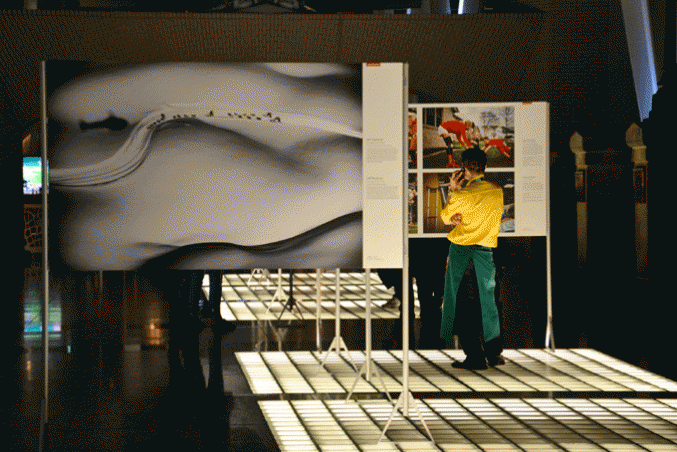By Sierra Bein
Ryerson professor Tony Burman kicked off the World Press Photo exhibit at Brookfield Place. The travelling exhibit features prize-winning entries from World Press Photo and runs from Sept. 30 – Oct. 21.
Would you encourage Ryerson students to come to the World press photo gallery?
I think its an opportunity to see the best photography in the world and it’s a reminder of how enduring photographs can be it’s a reminder of how informative a photograph can be compared to moving pictures. They tell a story and they show an aspect of reality that is really quite unique
Do you think that its relevant/relative to students at Ryerson?
I think what would be valuable would be for them to come and see whether there is any connection to their lives and I think they’ll discover that the stories that happen internationally are universal stories. They’re stories of heart break, oh hope, stories of idealism, the fact they happen in a far away country is really irrelevant. I think the universal power and strength of photographs are a reflection of how small this planet really is. In other words I think they’ll be surprised at how fascinated they’ll find it.
Here, we were talking about generationalism, a lot of people tend to say that our generation is desensitized, do you think that is this is true?
I think that young people today have in front of them, an incredible amount of images and distractions and opportunities. It’s more difficult for young people to navigate through it all compared to what it was when I was younger for example. On one level that’s intimidating on one level, that’s exciting. The world is far more accessible to young people today than it was for people when I was that age. So I think that what’s really important is that people find ways to navigate through he crap and see and read those things that really bring illumination to their lives so I think it’s a great time to be young, I just think its more onerous now than maybe before
Are we, our generation, forgetting to appreciate the photo, through all of this?
I think it’s a question of the power of moving pictures is far more evident than it was say, 20 years ago. So in that sense the competition is greater. But I think that when young people see an iconic photograph, and they imagine a story that’s inherent in that photograph I think they can discover that photographs will be with us forever. And I think they’ll eventually catch up with it. I just think at this stage, young people have so many other things put in front of them. But the photograph, the still image, the power of the still image, is not going anywhere. It will be with us. And I think young people will learn that over time.
So, we’re talking about the still image and its timelessness, but do you think these iconic images (especially the ones from today, from Vietnam, Tiananmen square,) that the iconic image will always remind the iconic image?
Yes. I think it will. For a variety of reasons, I think through the magic of cell phones and the fact that so many people now have access to camera in one form or another, than in the past. I mean it may be more difficult to sort through the vast number it was but I think people will do that, these organizations will do that, photographers will do that, and I think 20 years from now, 30 years from now, we’ll be looking back and remember the age in which we’re living right now has been captured by iconic photographs. We may not know what they are at the moment, but they will emerge as time goes on.
That was actually my next question, I mean we’re so flooded with immense amounts of images. We said today that 10 per cent of the world’s images were taken in the past few years. Do you think we’re still going to have, in our generation, iconic images?
I think it’ll just a challenge to figure out what they are, but they’ll emerge. And they’ll bubble to the top. Part of the reason is that I think there are camera now that have a lot more access to situations that were shut off to people before, because the camera are so small and ubiquitous and they’re everywhere. So I think in that sense they’ll be a bit of a balancing act, there’ll be a vast, greater number of images available but it’ll be more difficult for people to go through them but once that sorting is done I think those magical and I conic photographs, they will endure.













Leave a Reply